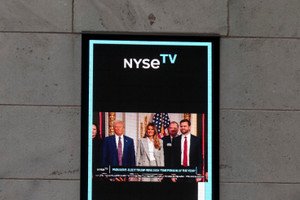Trump's return to the White House: Market winners and losers
Published by Global Banking & Finance Review®
Posted on January 21, 2025
5 min readLast updated: January 27, 2026

Published by Global Banking & Finance Review®
Posted on January 21, 2025
5 min readLast updated: January 27, 2026

Trump's White House return impacts global markets, with mixed reactions in currencies, stocks, and oil prices.
By Naomi Rovnick, Amanda Cooper and Dhara Ranasinghe
LONDON (Reuters) - U.S. President Donald Trump's return to the White House has been met with both relief and disappointment across world markets as investors try to work out what the next four years will bring.
"The approach will be chaotic, unpredictable, spur of the moment and driven by Trump himself," said Russel Matthews, senior portfolio manager, global macro at RBC BlueBay Asset Management.
Here's a look at some of the winners and losers emerging from Trump's first 24 hours in office.
1/ NAME CALLING
Calling out Canada and Mexico as potential targets for tariffs took a further toll on their currencies, which fell sharply following Trump's inauguration speech.
Bets on the Mexican peso or other tariff-exposed emerging market currencies were too risky, said Fidelity International multi-asset manager Becky Qin.
"It is so binary and so dependent on the dollar," she said. "The policy uncertainty is too high."
Goldman Sachs strategists said they see a 70% probability of Trump hitting China with 20% tariffs but said the odds of him fulfilling his pledge for 25% import levies on Canada and Mexico were low.
The dollar is trading near its strongest levels against Canada's currency in almost five years, with the so-called Loonie also weighed down by economic weakness and rate cut expectations.
Markets have swung towards bets that China will not permit its tightly controlled currency to weaken to counter heavy U.S. tariffs. Analysts still expect a 5% to 6% drop by year-end.
Fidelity's Qin said she had a position that would profit if the offshore yuan weakens further against the dollar, which may be one of the few trades that shines if aggressive tariffs spook markets.
2/ ROLLER COASTER
The euro and sterling rallied over 1% on Monday, notching their best one-day gains since late November versus the dollar, cheered by Trump's decision to not immediately impose tariffs.
Yet, Tuesday's falls in European currencies suggested the relief rally was already over.
ING currency strategist Francesco Pesole said if more days pass without Europe being explicitly mentioned in Trump’s tariff comments, the euro could benefit.
"That support may, however, prove rather short-lived as things can – as we learned yesterday with Canada and Mexico – change abruptly on protectionism, and the euro remains generally unappealing from a number of macro fundamentals," he said.
ABN AMRO downgraded its year-end euro/dollar forecast to $0.98 from $1, implying a 5% weakening from current levels.
3/ HOPE VERSUS FEAR
European equities posted their worst performance on record versus Wall Street last year but have gained more than 3% so far in January as investors judged pessimism about economic growth and U.S. tariffs to have gone too far.
European stocks attracted their second largest allocation from big investors in 25 years this month, BofA's latest global fund manager survey showed.
Amelie Derambure, senior multi-asset manager at Europe's biggest investor Amundi, said the group had raised its view on European stocks from negative to neutral on valuation grounds and favoured European banks for their relatively low exposure to tariffs.
And despite U.S. policy risks, Citi economists expect euro area economic growth of 1% this year, up from 0.8% in 2024, as ECB-POLICY-3fdc7763-f2c0-4c30-b494-8614852eaf43>ECB rate cuts boost business investment and consumer spending.
European stocks most exposed to U.S. trade policy were suffering on Tuesday, however, with shares in automakers Stellantis, Volkswagen and BMW all lower.
4/ "DRILL, BABY, DRILL"
Trump has vowed to increase U.S. oil and gas production, fill up strategic reserves and export American energy all over the world. U.S. oil prices have responded accordingly.
U.S. crude futures have fallen 4% in the last three trading days, while Brent crude shed just 2%.
The United States is already the world's largest producer of crude oil, accounting for around 12% of total supply. It's also a major exporter, with some 4 million barrels a day.
But it faces competition. The OPEC+ group of major exporters, which includes Russia, wants to remove self-imposed supply cuts, but is concerned about slack global demand.
Meanwhile, Trump's plans to impose a 25% tariff on Canadian imports could hurt U.S. refiners, who rely on their neighbour for about 20% of their barrels.
5/ OUT IN THE COLD
Notably, cryptocurrencies, which soared as Trump's Nov. 5 election win raised hopes of a more regulatory-friendly environment, suffered a setback as his first set of policies made no reference to the asset class.
Bitcoin, the world's largest cryptocurrency, pulled back from a record high of $109,071 on Monday. Trump launched a cryptocurrency of his own on Friday that was already 50% below Monday's peak price of $74.59, according to cryptocurrency price tracker CoinGecko.
Trump's inaugural speech disappointed those who had hoped he would kick-start a sea-change in U.S. policies towards crypto, which could pave the way for more selling, analysts said. Others said some of his staffing picks were a positive sign.
Trump has tapped two crypto-friendly figures - Mark Uyeda, a Republican member of the U.S. Securities and Exchange Commission, to be acting chair of the agency, and former SEC Commissioner Paul Atkins to run the agency on a permanent basis.
(Reporting by Naomi Rovnick, Amanda Cooper, Dhara Ranasinghe; Graphics and additional reporting by Nell Mackenzie; Editing by Kirsten Donovan)
The article discusses the impact of Trump's return to the White House on global markets and economies.
US tariffs have caused fluctuations in Canadian and Mexican currencies, with potential impacts on the euro.
Trump's energy policies have led to a decrease in US crude futures, affecting global oil prices.
Explore more articles in the Finance category




